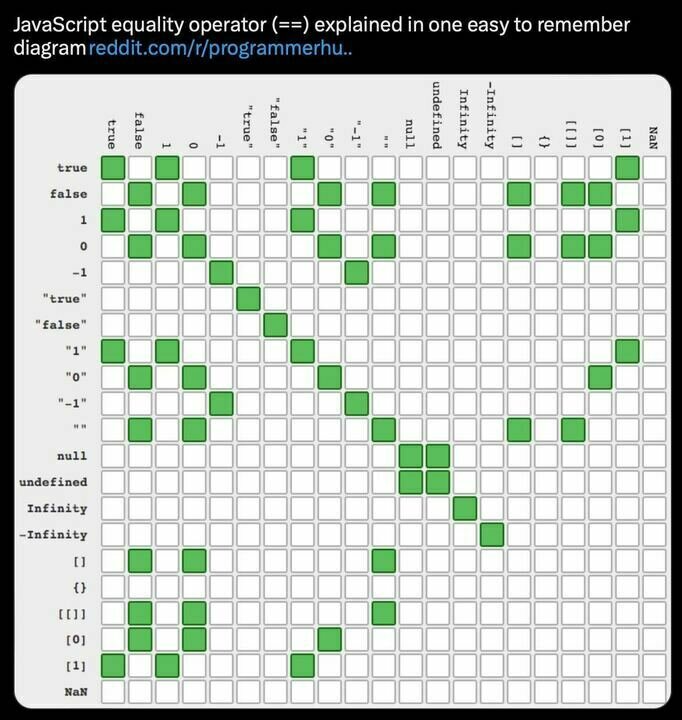Javascript
essentials
History of Javascript
- 1995 - Javascript in Netscape browser
- 2005 - AJAX based applications (Gmail)
- 2008 - Google Chrome with V8 engine
- 2009 - nodejs
What is node.js?
- environment for running Javascript
- doesn't need browser
- using V8
Install node

➡️ Hello world
- create file index.js with Javascript code
- execute file using: node index.js
console.log('Hello world');Javascript
Variables
var- let, const
let name = 'Martin';
name = 'Lucas';
const surname = 'Nuc';
Basic types
- number
- string
- boolean
- null, undefined
- objects
Strings
// 1) double quotes
let name = "Martin";
// 2) single quotes
let name = 'Martin';
// 3) backticks
let name = `Martin`;
let fullName = `${name} Nuc`;Strings
let name = 'Martin';
console.log(name.toUpperCase());
let characters = name.split('');
console.log(characters); // ['M', 'a', 'r'...]- have methods
null, undefined
- undefined = value was not set
-
null = "nothing"
- value set but it means "nothing" on purpose
Objects
later...
Loops
- for
- while
Conditions
let a = 5;
if (a === 5) {
console.log('is five');
}for (let i = 0; i < 10; i++) {
// ...
}
let i = 0;
while(i < 10) {
// ...
i++;
}Use === for comparison

Functions
- sequence of commands
- inputs
- output
- no return = undefined
function add(a, b) {
return a + b;
}How to create a function?
// 1) named function
function hello() {
console.log('hello');
}
// 2) anonymous function
const hello = function() {
console.log('hello');
}
// 3) anonymous using arrow function
const hello = () => console.log('hello');named
anonymous
Arrow function
// with body
const one = () => {
return 1;
};
// single returned statement
const two = () => 2;Clojure
function initialize() {
let cnt = 1;
return () => cnt++;
}
const fn = initialize();
console.log(fn()) // 1
console.log(fn()) // 2
console.log(fn()) // 3- function see surrounding variables
= lexical context
Objects
Objects
- not a primitive type
- used for structured data
- key: value
- key = property
let teacher = {
firstName: 'Martin',
surname: 'Nuc',
age: 32
}Modify object
let teacher = {
firstName: 'Martin',
surname: 'Nuc',
age: 32
}
// using dot notation
teacher.age = 33;
// using key name
teacher['age'] = 33;
let keyName = 'age';
teacher[keyName] = 33;Remove property
let teacher = {
firstName: 'Martin',
surname: 'Nuc',
age: 32
}
delete teacher.age;
console.log(teacher);Shorthand when creating object
let firstName = 'Martin';
let age = 32;
// create object
let teacher = {
firstName: firstName,
age: age
}
// shorthand:
let teacher = {
firstName,
age
}Spread operator
const martin = {
firstName: 'Martin',
age: 36
}
const richMartin = {
...martin,
money: 1000000
} - used to create a new object from another object
Stored as a reference
let teacher = {
firstName: 'Martin',
age: 32
}
let teacherTwo = teacher;
teacherTwo.age = 55;
console.log(teacher.age); // ????- not like primitive types
- use Object.assign() to create a copy (not in IE11)
Methods in objects
const obj = {
one: function() { return 1; },
two: () => 2,
three() {
return 3;
}
};
obj.four = () => 4;
obj.one();
obj.two();
obj.three();
obj.four();Destructuring object
const obj = {
firstName: 'Martin',
surname: 'Nuc',
age: 32
};
const { firstName, surname } = obj;
console.log(name, surname);
function printAge({age}) {
console.log(age);
}
printAge({
name: 'Martin',
age: 32
});
Rest operator
const obj = {
name: 'Martin',
surname: 'Nuc',
age: 32
};
const { name, surname, ...other } = obj;
console.log(other); // { age: 32 }
- "rest" after destructuring
typeof
typeof 5 // 'number'
typeof 'hi' // 'string'
typeof {} // 'object'
typeof [] // 'object'
typeof undefined // 'undefined'
typeof null // 'object' !!
Arrays
Arrays
- store multiple items
- in order
- .length = number of items
- push to add
let items = [1, 2, 3]; // creation
items.push(4);
console.log(items); // [1, 2, 3, 4]
console.log(items.length) // 4Access the index
- index starts with 0
let arr = ['one', 'two', 'three'];
console.log(arr[0]); // 'one'
console.log(arr[1]); // 'two'
console.log(arr[5]); // undefinedSpread operator
- expands array into individual items
- used to create a new array from existing
const arr = ['one', 'two', 'three'];
const newArray = [...arr, 'four'];➡️ Palindrome
- create a function which determines whether input is palindrome
- palindrome = word that reads the same backwards as forwards
Array methods
.join()
let arr = [1, 2, 3, 4];
let output = arr.join('-');
console.log(output); // '1-2-3-4'- creates string by joining items in the array
.reverse()
let arr = [1, 2, 3, 4];
arr.reverse();
console.log(arr); // [4, 3, 2, 1].forEach()
- loops over the array
[1, 2, 3, 4].forEach(item =>
console.log(item)
);.every(), .some()
- checks condition for every item
let result = [1, 2, 3, 4].every(item =>
item > 0
);
console.log(result); // true.map()
- creates a new array
- every item modified by a function
let result = [1, 2, 3, 4].map(item =>
item + 1;
);
console.log(result); // [2, 3, 4, 5].filter()
- creates a new array
- includes only items that pass the condition
let result = [1, 2, 3, 4].filter(x => x > 2);
console.log(result); // [3,4].reduce()
- accumulates intermediate result
[1,2,3,4].reduce((accumulator, current) =>
accumulator + current
, 0); // 10
| accumulator | current | result |
|---|---|---|
| 0 | 1 | 1 |
| 1 | 2 | 3 |
| 3 | 3 | 6 |
| 6 | 4 | 10 |
➡️ Sum of positives
- you have an array of numbers
-
(1) count how many positive numbers are there
- example: [1,-4,7,12] => 3
-
(2) you would like to calculate sum of positive values only
- example: [1,-4,7,12] => 1 + 7 + 12 = 20
String methods
.split()
- creates an array
- split by character
'Good morning'.split(' '); // ['Good', 'morning']
.replace()
- replaces only first match and returns a new string
let result = 'Good morning'
.replace('morning', 'afternoon');.match()
- search using RegEx
let result = 'aaa,aab,aac,abc,acc'.match(/aa.?/g);
console.log(result) // [ 'aaa', 'aab', 'aac' ] ➡️ Shortest word
- given a string of words, return the length of the shortest word(s)
- example: "Hi my name is Martin" => 2
Classes
What is a class?
- template for future objects
- needs to be instantiated using new keyword
- like a "recipe" for a chocolate cake. Using recipe you make a cake (instance of a cake)
class Dog {
bark() {
console.log('woof-woof');
}
}let rex = new Dog();
rex.bark();Might have properties
class Dog {
setName(newName) {
this.name = newName;
}
bark() {
console.log('woof-woof, I am ' + this.name);
}
}
let rex = new Dog();
rex.setName('Rex');
let lassie = new Dog();
lassie.setName('Lassie');
rex.bark(); // woof-woof, I am Rex
lassie.bark(); // woof-woof, I am Lassie- use this keyword to access properties
Constructor
class Dog {
constructor(name) {
this.name = name;
}
bark() {
console.log('woof-woof, I am ' + this.name);
}
}
let rex = new Dog('Rex');
rex.bark(); // woof-woof, I am Rex- method which is executed when the class is instantiated (when used with new)
Inheritance
class Animal {
eat() {
console.log('yum yum');
}
}
class Dog extends Animal {
constructor(name) {
this.name = name;
}
bark() {
console.log('woof-woof, I am ' + this.name);
}
}
let rex = new Dog('Rex');
rex.bark(); // woof-woof, I am Rex
rex.eat(); // yum yum- class can extend another class
- parent class should be more generic
setTimeout
setTimeout()
- do something later
- asynchronous
console.log(1);
setTimeout(() => console.log(2), 1000);
setTimeout(() => console.log(3), 2000);Event loop
- JS is single-threaded
- things get pull from event loop
console.log(1);
setTimeout(() => console.log(2), 0);
console.log(3);Context
this
What is context?
- the value of this keyword
- related not only to classes, it's everywhere
- typically it's set to object which the function belongs to BUT you never know
class Dog {
constructor(name) {
this.name = name;
}
bark() {
console.log('woof-woof, I am ' + this.name);
}
}
let rex = new Dog('Rex');
rex.bark();
Context
- depends on how the function is called
let obj = {
name: 'Martin',
sayHi() {
console.log(this.name);
}
}
obj.sayHi();
let fn = obj.sayHi;
fn();Enforce context
- using call+apply, bind
function fn(num) {
console.log(this, num);
}
// classic invocation
fn(1); // this = undefined
// call + apply
fn.call('test', 2); // this = 'test'
fn.apply('test', [3]); // this = 'test'
// bind
let bound = fn.bind('test');
bound(4); // this = 'test'
Example
- jQuery uses context:
$('a').each(function() {
console.log(this.href);
});Problem
- What context does a callback function have?
let obj = {
name: 'Martin',
hi() {
console.log(this.name);
setTimeout(function () {
console.log(this.name);
}, 1000);
}
}
obj.hi();
Arrow functions
- always pass the current context
let obj = {
name: 'Martin',
hi() {
console.log(this.name);
setTimeout(() => {
console.log(this.name);
}, 1000);
}
}
obj.hi();
➡️ Test your JS skills
- Write a function to find the first not repeated (unique) character in a string
obj = {a: 2, b: 3};
for(key in obj) {
console.log(key)
}
Promises
What are they for
- to avoid "callback hell"
- flat and readable code
- mostly used for asynchronous operations
- any asynchronous operation can be wrapped to a Promise
Problem: callback hell
setTimeout(() => {
console.log('after 1s');
setTimeout(() => {
console.log('after another 1s');
setTimeout(() => {
console.log('after another 1s');
}, 1000);
}, 1000);
}, 1000);Flat code with Promises
promise
.then(fn1)
.then(fn2)
.then(fn3)Promise state
- pending
- fulfilled (=resolved)
- rejected
pending
rejected
fullfilled
.then(...)
.catch(...)
How to create a promise
= instantiate a Promise object
function wait5seconds() {
return new Promise((resolve, reject) => {
setTimeout(() => resolve(), 5000);
});
};
wait5seconds().then(() => console.log('after 5s'));How to create a promise
shorthand for resolved / rejected promise
Promise.resolve()
Promise.reject()Pass data
- argument of resolve
- obtained in the first parameter of then
function wait5seconds() {
return new Promise((resolve, reject) => {
setTimeout(() => resolve([1, 2, 3]), 5000);
});
};
wait5seconds().then((data) => console.log(data));1. Error handling - catch
function fetchData() {
return new Promise((resolve, reject) => {
setTimeout(() => reject('This is error'), 5000);
});
};
fetchData()
.then((data) => console.log('success', data))
.catch((error) => console.log(error));Promise chaining
- what you return in then you get in the next then
- when it returns a Promise it will wait for that promise to resolve before going to next then
Promise.resolve('hey')
.then(data => console.log(data)) // "hey"
.then(() => anotherPromise()) // async
.then(() => {
return 'hello'; // sync
})
.then(param => console.log(param)); // "hello"Waiting for multiple promises
- Promise.all([promise1, promise 2])
- returns a single promise - resolved when all of them are resolved
- Promise.race([promise1, promise 2])
- resolved when the fastest one is resolved
➡️ Wrap setTimeout in Promise
- create function wait
- parameter: how long it should wait
- use promise chain (.then) to count down:
- console.log: 3,2,1, go!
async / await
async/await
- syntactic sugar around promises
- works only in async function
async function countDown() {
console.log(3);
await wait(1000);
console.log(2);
await wait(1000);
console.log(1);
await wait(1000);
console.log('go!');
}
countDown().then(() => console.log('done'));async/await
async function countDown() {
console.log(3);
await wait(1000);
console.log(2);
await wait(1000);
console.log(1);
await wait(1000);
console.log('go!');
}
countDown().then(() =>
console.log('done'));function countDown() {
console.log(3);
return wait(1000)
.then(() => console.log(2))
.then(() => wait(1000))
.then(() => console.log(1)
.then(() => wait(1000))
.then(() => console.log('go!'))
}
countDown().then(() =>
console.log('done'));Extract resolved data
async function fn() {
const data = await Promise.resolve('hello');
}Error handling in async fn
async function() {
try {
await Promise.reject('this is reason');
} catch (err) {
console.error(err);
}
}➡️ Rewrite using async/await
function fetchData(url) {
return new Promise((resolve, reject) => {
setTimeout(() => {
Math.random() < 0.5 ? resolve(Math.random()) : reject('Fetching failed')
}, 1000);
})
}
function execute() {
const results = [];
fetchData('seznam.cz')
.then((seznamData) => results.push(seznamData))
.then(() => fetchData('google.com'))
.then((googleData) => results.push(googleData))
.catch(error => console.log(error))
.then(() => console.log('done'))
}fetchData ramdomly fails
NPM
Dependency management
Node package manager
- packaging system
- large repository 3rd party libs
- https://www.npmjs.com
{
"name": "my-package",
"version": "1.0.0",
"description": "This is just description of my awesome package",
"main": "index.js",
"scripts": {
"dev": "nodemon --exec npm run start",
"start": "tsc && node dist/index.js",
"test": "mocha --opts mocha.opts"
},
"author": "Martin Nuc",
"license": "ISC",
"dependencies": {
"@types/chai": "4.0.4",
"@types/mocha": "2.2.43",
"@types/node": "8.0.28",
"@types/sinon": "2.3.4",
"chai": "4.1.2",
"mocha": "3.5.3",
"nodemon": "1.12.1",
"sinon": "3.2.1",
"ts-node": "3.3.0",
"typescript": "2.5.2"
}
}
package.json
Scripts
"scripts": {
"start": "react-scripts start",
"build": "react-scripts build",
"test": "react-scripts test",
"eject": "react-scripts eject"
},
- used to execute commands
- npm dependencies executables resolution (from node_modules/.bin/*)
npm run <name>
Shortcut for start and test scripts only. For others you have to use npm run
Runs any script from npm.
npm start
npm test
👉
➡️ Create NPM project
- create a folder and run npm init
- create index.js
- create start script to run it
Dependencies
npm install lodash
installs lodash library:
Use library in your code
import lodash from 'lodash';
lodash.difference([1, 2, 3], [2, 3]);Dependencies and GIT
- we don't commit dependencies
- put node_modules folder in .gitignore
- npm install to install dependencies

{
"name": "my-package",
"version": "1.0.0",
"description": "This is just description of my awesome package",
"main": "index.js",
"scripts": {
"dev": "nodemon --exec npm run start",
"start": "tsc && node dist/index.js",
"test": "mocha --opts mocha.opts"
},
"author": "Martin Nuc",
"license": "ISC",
"dependencies": {
"@types/chai": "4.0.4",
"@types/mocha": "2.2.43",
"@types/node": "8.0.28",
"@types/sinon": "2.3.4",
"lodash": "4.17.5",
"chai": "4.1.2",
"mocha": "3.5.3",
"nodemon": "1.12.1",
"sinon": "3.2.1",
"ts-node": "3.3.0",
"typescript": "2.5.2"
}
}
package.json
Semantic versioning
6.11.2
patch
minor version
major version
Semantic versioning
6.11.2
patch
minor version
major version
- major changes, breaks API
Semantic versioning
6.11.2
patch
minor version
- new features
- doesn't break API
major version
- major changes, breaks API
Semantic versioning
6.11.2
patch
- only bugfixes
minor version
- new features
- doesn't break API
major version
- major changes, breaks API
Tieto Javascript essentials
By Martin Nuc
Tieto Javascript essentials
- 256



